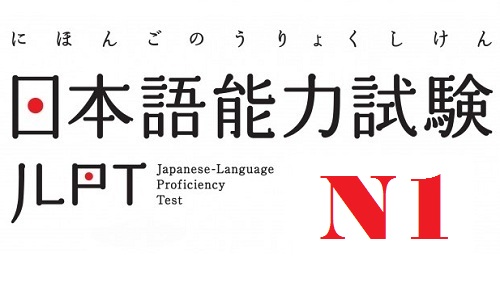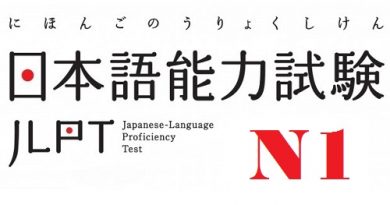Jlpt N1 vocabulary week 2
Jlpt N1 vocabulary week 2. To make it easier for you to study, Learn Japanese Online has collected Japanese N1 vocabularies from many sources. Each lesson contains 10 words (It’s a nice quantity for you to study regularly. The post is devided in to 6 days (or 1 week).
Contents
Tips for studying :
– Study regularly, do review in the next day, next 3 days and what you learnt in 1 week
– Note down difficult words that you spend all the week to study without result, then keep it with you to study anywhere
– You should imagine how the word is used in real life situation, make a sentence, or several other good ways in : How to learn Japanese.
– Determination and effort will help you to be successful !
Jlpt N1 vocabulary week 2
1. JLPT N1 Vocabulary day 7
61 . うつろ
Japanese dictionary : 表情などに生気のないさま
Meaning : blank (eyes, look), vacant (expression)
Example : うつろな目つき : blank look.
62 . 腕前(うでまえ)
Japanese dictionary : 巧みに物事をなしうる能力や技術
Meaning : ability, skill, facility
Example : 洋裁の腕前が上がる. improve Western dressmaking skill.
63 . うぬぼれ
Japanese dictionary : うぬぼれること
Meaning : conceit, hubris
Example : うぬぼれが強い. Be full of conceit.
64 . 生まれつき(うまれつき)
Japanese dictionary : まれながらにして備わっている能力・性質・容姿など
Meaning : by nature, by birth, naturally, natural
Example : 足が速いのは生まれ付きだ. It’s natural to be quick footed.
65 . 潤う(うるおう)
Japanese dictionary : 水分が行き渡る
Meaning : to be moist, to be damp, to be watered
Example : 慈雨で田畑が潤う. The fields are moist because of blessed rain.
66 . 上回る(うわまわる)
Japanese dictionary : ある基準数量を超える
Meaning : to exceed, to be more than
Example : 昨年を上回る人出. There are more people than last year.
67 . うんざり
Japanese dictionary : 物事に飽きて、つくづくいやになるさま
Meaning : boring, being fed up with
Example : あまりの長話にうんざりする. Be fed up with long story.
68 . 運用(うんよう)
Japanese dictionary : そのもののもつ機能を生かして用いること
Meaning : making use of, application
Example : 法規の運用を検討する. Discuss the application of laws and regulations.
69 . 円滑(えんかつ)
Japanese dictionary : 物事が滞らず、すらすら運ぶこと
Meaning : smooth
Example : 円滑な運営. Smooth operation.
70 . 婉曲な (えんきょくな)
Japanese dictionary : 露骨でなく、遠まわしに言うさま
Meaning : circumlocutory, indirect
Example : 婉曲な表現. Euphemistic expression. (Euphemism)
2. JLPT N1 Vocabulary day 8
71 . 円満(えんまん)
Japanese dictionary : 物事のようすや人柄などが、調和がとれていて穏やかなこと
Meaning : harmonious, smooth, happy
Example : 円満な夫婦 : Happy marriage.
72 . 追い込む(おいこむ)
Japanese dictionary : 相手を苦しい立場に立たせる
Meaning : to herd, to corner, to drive
Example : 辞任に追い込む : Force to resign.
73 . 負う(おう)
Japanese dictionary : お陰をこうむる
Meaning : to bear, to take responsibility for
Example : 先輩のご指導に負うところが大きい : It depends greatly on the guidance of the seniors.
74 . おおかた
Japanese dictionary : 物事や事柄の大体
Meaning : mostly, almost, nearly
Example : 大方は理解できた : I almost understand.
75 . 大柄(おおがら)
Japanese dictionary : 模様や縞柄 (しまがら) が普通より大きいこと
Meaning : large pattern
Example : 大柄なネクタイ : A tie with large pattern.
76 . 大げさ(おおげさ)
Japanese dictionary : 物事を実質以上に誇張するさま
Meaning : exaggerated
Example : 大袈裟に驚いてみせる : Show exaggerated surprise.
77 . おおすじ
Japanese dictionary : 物事の内容のだいたいのところ
Meaning : outline, summary
Example : 話の大筋をつかむ : Grasp the outline of the story.
78 . おおまかな
Japanese dictionary : 細かいことにこだわらずに物事を済ませるさま
Meaning : generous
Example : おおまかな人 : A generous person.
79 . 臆病(おくびょう)
Japanese dictionary : ちょっとしたことにも怖がったりしりごみしたりすること
Meaning : cowardly, easily frightened
Example : 臆病者 (おくびょうもの): Coward.
80 . おごる
Japanese dictionary : 自分の金で人にごちそうする
Meaning : to give someone a treat.
Example : 先輩におごってもらう : My senior gives me a treat.
3. JLPT N1 Vocabulary day 9
81 . 押し切る(おしきる)
Japanese dictionary : 切るを強める語
Meaning : emphasis of separation
Example : 彼女を 押し切りて : separate from her
82 . 押し込む(おしこむ)
Japanese dictionary : 無理に入り込む
Meaning : to push into
Example : 自殺に押し込む : push into suicide
83 . 押し寄せる(おしよせる)
Japanese dictionary : 押して一方に寄せる
Meaning : to push aside, to rush for (the door)
Example : 車に人を押し寄せる : push people to the car
84 . おそくとも
Japanese dictionary : 遅くもに同じ
Meaning : at the latest
Example : 遅くとも明日には仕上がる : at the latest, it must be done by tomorrow.
85 . 恐れ(おそれ)
Japanese dictionary : よくないことが起こるかもしれないという心配
Meaning : fear, concern, anxiety
Example : 自殺の恐れがある : There is a risk of suicide.
86 . 恐れ入る(恐れ入る)
Japanese dictionary : 相手の好意などに対して、ありがたいと思う
Meaning : to be grateful. A respectful way of saying sumimasen
Example : ご厚情のほど恐れ入ります : I am grateful to your kindness
87 . おだてる
Japanese dictionary : うれしがることを言って、相手を得意にさせる
Meaning : to flatter
Example :あれはおだてられると何でもする男だ. When he is flattered, he will do anything
88 . おちこむ
Japanese dictionary : 目立って下がる
Meaning : to be in a slump, to be in an unfavorable condition
Example : 景気がおちこむむ : The business condition is in a slump
89 . お手上げ(おてあげ)
Japanese dictionary : どうにもしようがないこと
Meaning : giving up, not knowing what to do
Example : 騒音対策はお手上げの状態だ : Noise measure is in a hopeless situation
90 . おどおど
Japanese dictionary : 緊張・不安や恐怖心で落ち着かないさま
Meaning : nervously, trembling
Example : 人前ではいつもおどおどしている : I’m always nervous in public
4. JLPT N1 Vocabulary day 10
91 . おどす
Japanese dictionary : 相手を恐れさせる
Meaning : to threaten
Example : おどして金を取る : threaten to take money
92 . おのずから
Japanese dictionary : そのもの自体の力、成り行きに基づくさま。自然に
Meaning : naturally, as a matter of course
Example : この誤解は時が来れば自ずから解ける : when the time comes, this misunderstanding will be solved by itself
93 . おびえる
Japanese dictionary : 怖がってびくびくする
Meaning :to be scared of, to be frightened of
Example : 不安におびえる : become frightened out of insecurity
94 . おびただしい
Japanese dictionary : 数や量が非常に多い
Meaning : large number
Example : おびただしい人出 : a large number of people
95 . 脅かす(おびやかす)
Japanese dictionary : 危険な状態にする
Meaning : to threaten, to menace, to intimidate
Example : インフレが家計を脅かす : Inflation threatens the family finances
96 . 帯びる(おびる)
Japanese dictionary : ある性質・成分・傾向などを含み持つ
Meaning : to take on
Example : 赤の色を帯びる : take the red color
97 . おまけ
Japanese dictionary : 商品を値引きすること
Meaning : price reduction, discount
Example : 100円お負けしておきます : 100 yen discount
98 . 思い付き(おもいつき)
Japanese dictionary : ふと浮かんだ考え
Meaning : (sudden) plan, idea
Example : なかなかいい思い付きだ : It’s a good idea
99 . 趣(おもむき)
Japanese dictionary : 自然にそう感じられる有様
Meaning : taste
Example : 冬枯れの景色も趣がある : The scene of wintry desolation also has its taste
山幽谷の趣がある : The atmosphere of deep ravine
100 . 重んじる(おもんじる)
Japanese dictionary : [動ザ上一]「おもんずる」(サ変)の上一段化
Meaning : to respect, to honor, to prize
Example : 名誉を重んじる : respect honor
5. JLPT N1 Vocabulary day 11
101 . 及ぶ(およぶ)
Japanese dictionary : ある状態にたちいたる
Meaning : to reach
Example : この期に及んで、まだ決めかねている : at the last moment, I still can’t decide
102 . 折り返す(おりかえす)
Japanese dictionary : ある地点まで行って、来た方向へ戻る
Meaning : to fold back, to turn back
Example : この先不通のため当駅で折り返します : I return to this station due to the interruption ahead
103 . 温和(おんわ)
Japanese dictionary : 気候が暖かで、厳しい変化のないこと
Meaning : mild (climate)
Example : 温和な土地 : mild land
104 . ~界(かい)
Japanese dictionary : 範囲を区切った特定の場所
Meaning : kingdom
Example : 芸術界: world of art
105 . 回収(かいしゅう)
Japanese dictionary : 一度配った物や使った物などを、また集めること
Meaning : collection, recovery
Example : 廃品回収: Garbage collection
106 . 該当(がいとう)
Japanese dictionary : ある条件・資格などに、当てはまること
Meaning : corresponding to, being relevant to, meeting (conditions)
Example : 該当する箇所に丸をつける : Circle the applicable points
107 . 街頭(がいとう)
Japanese dictionary : 市街地の道路や広場。町なか。
Meaning : (on the) street
Example : 街頭演説 : street oratory
108 . 介入(かいにゅう)
Japanese dictionary : 当事者以外の者が入り込むこと
Meaning : intervention
Example : 国際紛争に介入する : intervene in international dispute
109 . 介抱(かいほう)
Japanese dictionary : 病人・けが人・酔っぱらいなどの世話をすること
Meaning : nursing, looking after
Example : 手厚く介抱する : warmly look after someone
110 . 顧みる(かえりみる)
Japanese dictionary : 過ぎ去った事を思い起こす
Meaning : to look back on (the past), to reminisce about
Example : 半生(はんせい)を顧みる : look back on the past life
6. JLPT N1 Vocabulary day 12
111 . 顔つき(かおつき)顔のようす
Japanese dictionary : none
Meaning : (outward) looks, face, expression
Example : 物欲しげな顔付きをする : make a greedy face
112 . かきまわす
Japanese dictionary : 手や道具をある物の中に入れて、ぐるぐるまわす
Meaning : to stir
Example : 風呂の湯をかきまわす : stir the hot water of the bath
113 . かくさ
Japanese dictionary : 資格・等級・価格などの違い。差。
Meaning : qualitative difference, disparity
Example : 賃金の格差を是正する : review the wage difference
114 . かけ
Japanese dictionary : 結果は運にまかせて、思い切って物事をすること
Meaning : bet, wager, stake, gamble
Example : 大きな賭けに出る : take part in a big bet
115 . かさばる
Japanese dictionary : 物のかさが増す。体積が大きくて場所をとる
Meaning : to be bulky
Example : 荷物がかさばる : the luggage is bulky
116 . かさむ
Japanese dictionary : 体積・分量・数量が増える
Meaning : to increase
Example : 荷がかさむ : the goods increases
117 . 箇条書き(かじょうがき)
Japanese dictionary : 一つ一つの条項に分けて書き並べること
Meaning : itemized form, itemization
Example : 問題点を箇条書きにする : list the problematic issues
118 . かすか
Japanese dictionary : やっと感じ取れる程度であるさま。はっきりとは認められないさま
Meaning : slight, weak, indistinct, faint
Example : かすかな物音 : faint sound
119 . かすむ
Japanese dictionary : ぼんやりして、物の姿や形がはっきり見えなくなる
Meaning : to become hazy
Example : 雨にかすむ街 : The city becomes hazy in the rain
120 . かする
Japanese dictionary : 軽く触れて通り過ぎる
Meaning : to graze, to touch lightly
Example : 弾丸が耳をかすった : The bullet grazed the ear
Above is Jlpt N1 vocabulary week 2. Learn the following weeks in the category : JLPT N1 Vocabulary.
Good luck !
